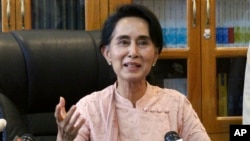Myanmar's opposition leader and democracy champion Aung San Suu Kyi will visit China for the first time next week, Beijing and her party said Friday, amid strained relations between the two countries.
Suu Kyi is an international democracy icon for her yearslong defiance of an authoritarian military regime in Myanmar. She now has ambitions for her country's presidency, which would involve the need for smooth relations with Beijing.
She will meet Chinese President Xi Jinping and Premier Li Keqiang on the June 10-14 trip.
China's Foreign Ministry said Suu Kyi was invited by China's Communist Party for an inter-party exchange between the two countries.
"We hope to further enhance bilateral communication and understanding through this visit to push ahead with the friendship development between China and Myanmar in various areas," Chinese Foreign Ministry spokesman Hong Lei said at a regular briefing Friday.
Former ties
Beijing was a key backer of Myanmar's military junta while it was under Western sanctions, but since taking power in March 2011, Myanmar's reformist government has sought to decrease the heavy dependence on China.
In addition, conflict in a border area as well as fears over resource-grabbing by China have chilled ties.
Suu Kyi led the NLD to a sweeping victory in general elections in 1990, but the military government refused to recognize the results.
In November, the country will hold its first free vote in 25 years, and the NLD is expected to do well.
Suu Kyi is excluded from the presidency under a military-drafted constitution, but her power and influence will grow if the NLD performs as well as expected.
She became an international icon after winning the Nobel Peace Prize in 1991 for her pro-democracy efforts and spent most of the next two decades under house arrest where she continued to resist Myanmar's military rulers. She was freed in 2010.
Nobel laureate, Rohingya issues
While in Beijing, she will likely face calls to raise the case of fellow Nobel laureate Chinese writer Liu Xiaobo, sentenced to 11 years in prison in 2009 for circulating a petition calling for democratic reforms.
But she has come under wide international criticism in recent months over her silence on Myanmar's treatment of minority Muslim Rohingya, who are fleeing the country in rickety boats in search of a better life, with no country wanting to take them in.
Most of the 1.1 million Rohingya in Myanmar are stateless and live in apartheid-like conditions. Almost 140,000 were displaced in deadly clashes with Buddhists in Rakhine state in 2012.
The relationship between China and Myanmar has been strained since earlier this year as an ethnic insurgency raging in the southeast Asian country spilled across the two countries' borders. In March, a Myanmar warplane dropped a bomb in a sugarcane field, killing five Chinese people and injuring eight others.
China also held land and air live fire drills along parts of the border this week.
Material for this report came from Reuters, AP and AFP.







